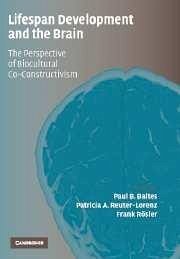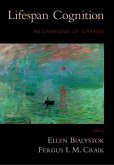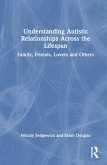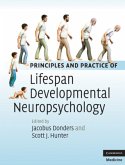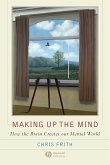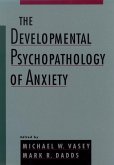Paul B. Baltes / Patricia A. Reuter-Lorenz / Frank Rosler (eds.)The Perspective of Biocultural Co-Constructivism
Lifespan Development and the Brain
The Perspective of Biocultural Co-Constructivism
Herausgeber: Baltes, Paul B; Rösler, Frank; Reuter-Lorenz, Patricia A
Paul B. Baltes / Patricia A. Reuter-Lorenz / Frank Rosler (eds.)The Perspective of Biocultural Co-Constructivism
Lifespan Development and the Brain
The Perspective of Biocultural Co-Constructivism
Herausgeber: Baltes, Paul B; Rösler, Frank; Reuter-Lorenz, Patricia A
- Gebundenes Buch
- Merkliste
- Auf die Merkliste
- Bewerten Bewerten
- Teilen
- Produkt teilen
- Produkterinnerung
- Produkterinnerung
The brain as the dominant actor in the determination of human behavior is at risk of fostering the view that the brain is in full control. The potential consequence of a predominant brain-based view is that the role of cultural factors and other environment-based experiences is easily neglected if not overlooked. This volume provides a more balanced view of the nature (brain)-nurture (culture/environment) interaction. It shows that throughout life, brain and culture influence and modify each other. The metaphor of biocultural co-construction is meant to solidify this approach.
Andere Kunden interessierten sich auch für
![Handbook of Stressful Transitions Across the Lifespan Handbook of Stressful Transitions Across the Lifespan]() Handbook of Stressful Transitions Across the Lifespan261,99 €
Handbook of Stressful Transitions Across the Lifespan261,99 €![Lifespan Cognition Lifespan Cognition]() Ellen Bialystok / Fergus I. M. Craik (eds.)Lifespan Cognition102,99 €
Ellen Bialystok / Fergus I. M. Craik (eds.)Lifespan Cognition102,99 €![Understanding Autistic Relationships Across the Lifespan Understanding Autistic Relationships Across the Lifespan]() Felicity SedgewickUnderstanding Autistic Relationships Across the Lifespan167,99 €
Felicity SedgewickUnderstanding Autistic Relationships Across the Lifespan167,99 €![Principles and Practice of Lifespan Developmental Neuropsychology Principles and Practice of Lifespan Developmental Neuropsychology]() Principles and Practice of Lifespan Developmental Neuropsychology157,99 €
Principles and Practice of Lifespan Developmental Neuropsychology157,99 €![Emotional Memory Across the Adult Lifespan Emotional Memory Across the Adult Lifespan]() Elizabeth A KensingerEmotional Memory Across the Adult Lifespan124,99 €
Elizabeth A KensingerEmotional Memory Across the Adult Lifespan124,99 €![Making Up the Mind Making Up the Mind]() Chris FrithMaking Up the Mind40,99 €
Chris FrithMaking Up the Mind40,99 €![The Developmental Psychopathology of Anxiety The Developmental Psychopathology of Anxiety]() Michael W. Vasey / Mark R. Dadds (eds.)The Developmental Psychopathology of Anxiety162,99 €
Michael W. Vasey / Mark R. Dadds (eds.)The Developmental Psychopathology of Anxiety162,99 €-
-
-
The brain as the dominant actor in the determination of human behavior is at risk of fostering the view that the brain is in full control. The potential consequence of a predominant brain-based view is that the role of cultural factors and other environment-based experiences is easily neglected if not overlooked. This volume provides a more balanced view of the nature (brain)-nurture (culture/environment) interaction. It shows that throughout life, brain and culture influence and modify each other. The metaphor of biocultural co-construction is meant to solidify this approach.
Hinweis: Dieser Artikel kann nur an eine deutsche Lieferadresse ausgeliefert werden.
Hinweis: Dieser Artikel kann nur an eine deutsche Lieferadresse ausgeliefert werden.
Produktdetails
- Produktdetails
- Verlag: Cambridge University Press
- Seitenzahl: 444
- Erscheinungstermin: 19. Juni 2006
- Englisch
- Abmessung: 233mm x 160mm x 28mm
- Gewicht: 735g
- ISBN-13: 9780521844949
- ISBN-10: 0521844940
- Artikelnr.: 22226206
- Herstellerkennzeichnung
- Libri GmbH
- Europaallee 1
- 36244 Bad Hersfeld
- gpsr@libri.de
- Verlag: Cambridge University Press
- Seitenzahl: 444
- Erscheinungstermin: 19. Juni 2006
- Englisch
- Abmessung: 233mm x 160mm x 28mm
- Gewicht: 735g
- ISBN-13: 9780521844949
- ISBN-10: 0521844940
- Artikelnr.: 22226206
- Herstellerkennzeichnung
- Libri GmbH
- Europaallee 1
- 36244 Bad Hersfeld
- gpsr@libri.de
Paul B. Baltes is noted for his theoretical and empirical work in developmental psychology and the interdisciplinary study of human aging. Aside from multiple honorary doctorates, and election to academies, he has received numerous awards including the International Psychology Award of the American Psychological Association, the Lifetime Achievement Award of the German Psychological Society, and the Aristotle Prize of the European Federation of Psychological Associations.
Patricia Reuter-Lorenz is noted for her research on the neuropsychological mechanisms of attention and working memory, in particular, through her work with special patient populations, functional brain imaging, and normal human aging. She is co-founder of the Cognitive Neuroscience Society, has served on its governing board since its inception, and serves on the editorial boards of leading journals in the field.
Frank Rösler is noted for his research on biological correlates of cognitive processes, in particular, memory, learning, imagery, language, and neural plasticity. He received several awards, among others the Max-Planck/Humboldt prize for international cooperation and he has been elected as full member in two Academies of Sciences in Germany.
Patricia Reuter-Lorenz is noted for her research on the neuropsychological mechanisms of attention and working memory, in particular, through her work with special patient populations, functional brain imaging, and normal human aging. She is co-founder of the Cognitive Neuroscience Society, has served on its governing board since its inception, and serves on the editorial boards of leading journals in the field.
Frank Rösler is noted for his research on biological correlates of cognitive processes, in particular, memory, learning, imagery, language, and neural plasticity. He received several awards, among others the Max-Planck/Humboldt prize for international cooperation and he has been elected as full member in two Academies of Sciences in Germany.
Preface Paul B. Baltes, Patricia A. Reuter-Lorenz and Frank Rösler; Part I.
Setting the Stage across the Ages of the Lifespan: 1. Prologue: biocultural
co-constructivism as a theoretical metascript Paul B. Baltes, Frank Rösler
and Patricia A. Reuter-Lorenz; 2. Biocultural co-construction of lifespan
development Shu-Chen Li; Part II. Neuronal Plasticity and Biocultural
Co-Construction: Microstructure Meets the Experiential Environment: 3.
Neurobehavioral development in the context of biocultural co-constructivism
Charles A. Nelson; 4. Adult neurogenesis Gerd Kempermann; Part III.
Neuronal Plasticity and Biocultural Co-Construction: Atypical Brain
Architectures: 5. Sensory input-based adaptation and brain architecture
Maurice Ptito and Sébastien Desgent; 6. Blindness: a source and case of
neuronal plasticity Brigitte Röder; Part IV. Biocultural Co-Construction:
Specific Functions and Domains: 7. Language acquisition: biological versus
cultural implications for brain structure Angela D. Friederici and
Shirley-Ann Rüschemeyer; 8. Reading, writing, and arithmetic in the brain:
neural specialization for acquired functions Thad A. Polk and J. Paul
Hamilton; 9. Emotion, learning, and the brain: from classical conditioning
to cultural bias Elizabeth A. Phelps; 10. The musical mind: neural tuning
and the aesthetic experience Oliver Vitouch; Part V. Plasticity and
Biocultural Co-Construction in Later Life: 11. Influences of biological and
self-initiated factors on brain and cognition in adulthood and aging Lars
Nyberg and Lars Bäckman; 12. The aging mind and brain: implications of
enduring plasticity for behavioral and cultural change Patricia A.
Reuter-Lorenz and Joseph A. Mikels; Part VI. Biocultural
Co-Construction: From Micro- to Macroenvironments in Larger Cultural
Contexts: 13. Characteristics of illiterate and literate cognitive
processing: implications of brain-behavior co-constructivism Karl Magnus
Petersson and Alexandra Reis; 14. The influence of work and occupation on
brain development Neil Charness; 15. The influence of organized violence
and terror on brain and mind: a co-constructive perspective Thomas Elbert,
Brigitte Rockstroh, Iris-Tatjana Kolassa, Maggie Schauer and Frank Neuner;
16. Co-constructing human engineering technologies in old age: lifespan
psychology as a conceptual foundation Ulman Lindenberger and Martin Lövdén;
Part VII. Epilogue: 17. Letters on nature and nurture Onur Güntürkün.
Setting the Stage across the Ages of the Lifespan: 1. Prologue: biocultural
co-constructivism as a theoretical metascript Paul B. Baltes, Frank Rösler
and Patricia A. Reuter-Lorenz; 2. Biocultural co-construction of lifespan
development Shu-Chen Li; Part II. Neuronal Plasticity and Biocultural
Co-Construction: Microstructure Meets the Experiential Environment: 3.
Neurobehavioral development in the context of biocultural co-constructivism
Charles A. Nelson; 4. Adult neurogenesis Gerd Kempermann; Part III.
Neuronal Plasticity and Biocultural Co-Construction: Atypical Brain
Architectures: 5. Sensory input-based adaptation and brain architecture
Maurice Ptito and Sébastien Desgent; 6. Blindness: a source and case of
neuronal plasticity Brigitte Röder; Part IV. Biocultural Co-Construction:
Specific Functions and Domains: 7. Language acquisition: biological versus
cultural implications for brain structure Angela D. Friederici and
Shirley-Ann Rüschemeyer; 8. Reading, writing, and arithmetic in the brain:
neural specialization for acquired functions Thad A. Polk and J. Paul
Hamilton; 9. Emotion, learning, and the brain: from classical conditioning
to cultural bias Elizabeth A. Phelps; 10. The musical mind: neural tuning
and the aesthetic experience Oliver Vitouch; Part V. Plasticity and
Biocultural Co-Construction in Later Life: 11. Influences of biological and
self-initiated factors on brain and cognition in adulthood and aging Lars
Nyberg and Lars Bäckman; 12. The aging mind and brain: implications of
enduring plasticity for behavioral and cultural change Patricia A.
Reuter-Lorenz and Joseph A. Mikels; Part VI. Biocultural
Co-Construction: From Micro- to Macroenvironments in Larger Cultural
Contexts: 13. Characteristics of illiterate and literate cognitive
processing: implications of brain-behavior co-constructivism Karl Magnus
Petersson and Alexandra Reis; 14. The influence of work and occupation on
brain development Neil Charness; 15. The influence of organized violence
and terror on brain and mind: a co-constructive perspective Thomas Elbert,
Brigitte Rockstroh, Iris-Tatjana Kolassa, Maggie Schauer and Frank Neuner;
16. Co-constructing human engineering technologies in old age: lifespan
psychology as a conceptual foundation Ulman Lindenberger and Martin Lövdén;
Part VII. Epilogue: 17. Letters on nature and nurture Onur Güntürkün.
Preface Paul B. Baltes, Patricia A. Reuter-Lorenz and Frank Rösler; Part I.
Setting the Stage across the Ages of the Lifespan: 1. Prologue: biocultural
co-constructivism as a theoretical metascript Paul B. Baltes, Frank Rösler
and Patricia A. Reuter-Lorenz; 2. Biocultural co-construction of lifespan
development Shu-Chen Li; Part II. Neuronal Plasticity and Biocultural
Co-Construction: Microstructure Meets the Experiential Environment: 3.
Neurobehavioral development in the context of biocultural co-constructivism
Charles A. Nelson; 4. Adult neurogenesis Gerd Kempermann; Part III.
Neuronal Plasticity and Biocultural Co-Construction: Atypical Brain
Architectures: 5. Sensory input-based adaptation and brain architecture
Maurice Ptito and Sébastien Desgent; 6. Blindness: a source and case of
neuronal plasticity Brigitte Röder; Part IV. Biocultural Co-Construction:
Specific Functions and Domains: 7. Language acquisition: biological versus
cultural implications for brain structure Angela D. Friederici and
Shirley-Ann Rüschemeyer; 8. Reading, writing, and arithmetic in the brain:
neural specialization for acquired functions Thad A. Polk and J. Paul
Hamilton; 9. Emotion, learning, and the brain: from classical conditioning
to cultural bias Elizabeth A. Phelps; 10. The musical mind: neural tuning
and the aesthetic experience Oliver Vitouch; Part V. Plasticity and
Biocultural Co-Construction in Later Life: 11. Influences of biological and
self-initiated factors on brain and cognition in adulthood and aging Lars
Nyberg and Lars Bäckman; 12. The aging mind and brain: implications of
enduring plasticity for behavioral and cultural change Patricia A.
Reuter-Lorenz and Joseph A. Mikels; Part VI. Biocultural
Co-Construction: From Micro- to Macroenvironments in Larger Cultural
Contexts: 13. Characteristics of illiterate and literate cognitive
processing: implications of brain-behavior co-constructivism Karl Magnus
Petersson and Alexandra Reis; 14. The influence of work and occupation on
brain development Neil Charness; 15. The influence of organized violence
and terror on brain and mind: a co-constructive perspective Thomas Elbert,
Brigitte Rockstroh, Iris-Tatjana Kolassa, Maggie Schauer and Frank Neuner;
16. Co-constructing human engineering technologies in old age: lifespan
psychology as a conceptual foundation Ulman Lindenberger and Martin Lövdén;
Part VII. Epilogue: 17. Letters on nature and nurture Onur Güntürkün.
Setting the Stage across the Ages of the Lifespan: 1. Prologue: biocultural
co-constructivism as a theoretical metascript Paul B. Baltes, Frank Rösler
and Patricia A. Reuter-Lorenz; 2. Biocultural co-construction of lifespan
development Shu-Chen Li; Part II. Neuronal Plasticity and Biocultural
Co-Construction: Microstructure Meets the Experiential Environment: 3.
Neurobehavioral development in the context of biocultural co-constructivism
Charles A. Nelson; 4. Adult neurogenesis Gerd Kempermann; Part III.
Neuronal Plasticity and Biocultural Co-Construction: Atypical Brain
Architectures: 5. Sensory input-based adaptation and brain architecture
Maurice Ptito and Sébastien Desgent; 6. Blindness: a source and case of
neuronal plasticity Brigitte Röder; Part IV. Biocultural Co-Construction:
Specific Functions and Domains: 7. Language acquisition: biological versus
cultural implications for brain structure Angela D. Friederici and
Shirley-Ann Rüschemeyer; 8. Reading, writing, and arithmetic in the brain:
neural specialization for acquired functions Thad A. Polk and J. Paul
Hamilton; 9. Emotion, learning, and the brain: from classical conditioning
to cultural bias Elizabeth A. Phelps; 10. The musical mind: neural tuning
and the aesthetic experience Oliver Vitouch; Part V. Plasticity and
Biocultural Co-Construction in Later Life: 11. Influences of biological and
self-initiated factors on brain and cognition in adulthood and aging Lars
Nyberg and Lars Bäckman; 12. The aging mind and brain: implications of
enduring plasticity for behavioral and cultural change Patricia A.
Reuter-Lorenz and Joseph A. Mikels; Part VI. Biocultural
Co-Construction: From Micro- to Macroenvironments in Larger Cultural
Contexts: 13. Characteristics of illiterate and literate cognitive
processing: implications of brain-behavior co-constructivism Karl Magnus
Petersson and Alexandra Reis; 14. The influence of work and occupation on
brain development Neil Charness; 15. The influence of organized violence
and terror on brain and mind: a co-constructive perspective Thomas Elbert,
Brigitte Rockstroh, Iris-Tatjana Kolassa, Maggie Schauer and Frank Neuner;
16. Co-constructing human engineering technologies in old age: lifespan
psychology as a conceptual foundation Ulman Lindenberger and Martin Lövdén;
Part VII. Epilogue: 17. Letters on nature and nurture Onur Güntürkün.

